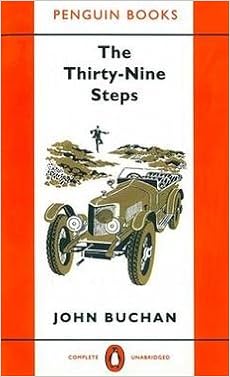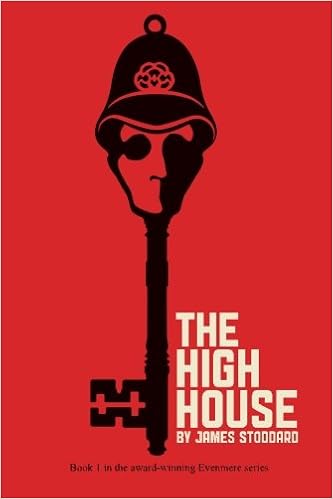Favorite Books Read in 2018
Here are some of the books I enjoyed most this year:
 * Jane Austen, Sense and Sensibility. I sometimes baulk at reading a classic when there are so many other more immediately gripping books calling out to me. So I experimented this year with reading a few pages of a classic every day. This was the first classic I read that way.
* Jane Austen, Sense and Sensibility. I sometimes baulk at reading a classic when there are so many other more immediately gripping books calling out to me. So I experimented this year with reading a few pages of a classic every day. This was the first classic I read that way.
* John Blackburn, The Gaunt Woman. A page-turner; very well done.
* John Buchan, The Thirty-Nine Steps and Greenmantle. I had the great pleasure this year of introducing my children to John Buchan’s works, reading these two aloud. Can’t wait to get on to Mr. Standfast in the new year.
*James Branch Cabell, The Line of Love: Dizain des Mariages. All the stories were good, even surprisingly good, but my favorite was probably “Love-Letters of Falstaff.” Cabell does an amazingly good job of putting quasi-Shakespearean language in Falstaff’s mouth and the story might break your heart.
* G. K. Chesterton, Robert Browning. Excellent. Almost every page quotable.
* August Derleth, Restless Is the River. If Derleth is known for anything these days, it’s for publishing the works of H. P. Lovecraft. Derleth himself wrote popular fiction: mysteries, eerie stories, boys’ adventure novels — his Steve & Sim series are like the Hardy Boys with more three-dimensional characters and a strong sense of place. And sense of place was closest to Derleth’s heart, particularly the Sauk City, Wisconsin, area, which he loved (and which, in so many of his books, he called Sac Prairie). Restless Is the River follows the equally excellent Wind Over Wisconsin, both of them historical novels set in the days when Sauk City was only a twinkle in the eyes of its founders.
* Wesley Hill, Washed and Waiting: Reflections on Christian Faithfulness and Homosexuality. Very good, though I quibble with a few things here and there.
 * Rosalie K. Fry, Secret of the Ron Mor Skerry. This is the novel behind John Sayles’ beautiful film, The Secret of Roan Inish. We had watched the movie as a family, but this year we read the novel aloud.
* Rosalie K. Fry, Secret of the Ron Mor Skerry. This is the novel behind John Sayles’ beautiful film, The Secret of Roan Inish. We had watched the movie as a family, but this year we read the novel aloud.
* Shirley Ann Grau, The Black Prince and Other Stories. Very good; the title story may be the weakest in the collection.
* David Hansen, Loving the Church You Lead: Pastoring with Acceptance and Grace. Some very good passages.
* Adolph L. Harstad, Joshua. In the Concordia Commentaries series. The best commentary I’ve read on Joshua.
* David Instone-Brewer, Divorce and Remarriage in the Bible: The Social and Literary Context. Best book I’ve read on the subject; extremely helpful, but flawed in some significant ways, chief among them this: I-B thinks “hardness of heart” means a refusal to repent, so that divorce is legitimate only in the case of the guilty party’s refusal to repent; if he repents, he is to be forgiven and then no divorce should take place.
* James B. Jordan, Slavery in Biblical Perspective.
* Jane Lane, He Stooped to Conquer and His Fight Is Ours. Well-written historical fiction, the first about the massacre at Glencoe and the second about the aftermath a generation later. Lane seems to accept the mytho fo the Highland tradition — kilts, bagpipes, Ossian, the Highlanders being the Caledonians who fought the Romans, and so on — but that aside, she does a masterful job of getting us into the mindset of the Highland Jacobites.
* Peter J. Leithart, The End of Protestantism: Pursuing Unity in a Fragmented Church. Very, very good.
* Janet Lewis, The Wife of Martin Guerre. This is historical fiction, but based on a true case from the French courts in the 1500s, to my mind surely one of the most fascinating legal cases ever. I went on to read Natalie Zemon Davis’s history, The Return of Martin Guerre, and some of the discussion of that book online, because I wanted to know more about the story.
* Charlotte M. Mason, Home Education. So good.
* Allan Campbell McLean, The Hill of the Red Fox. Like a John Buchan novel, but written for young adults.
 * A. A. Milne, The House at Pooh Corner. Every time I finish this or Winnie-the-Pooh, I say to myself, “I have to read these books every year.”
* A. A. Milne, The House at Pooh Corner. Every time I finish this or Winnie-the-Pooh, I say to myself, “I have to read these books every year.”
* Gary North, Moses and Pharaoh: Dominion Religion Versus Power Religion. I’m not on the same page with North in several regards, but there’s a lot of great stuff in here. The chapter on the rule of law was particularly valuable.
* Arthur Ransome, Swallows and Amazons. Read aloud to the kids; we loved it.
* Dorothy L. Sayers, Are Women Human?. Two great essays. Very thought-provoking.
* Margery Sharp, Miss Bianca. Another one I read with the kids.
* James Stoddard, The High House. I cut my eyeteeth, as it were, on the old Ballantine Adult Fantasy series, edited by Lin Carter and so did James Stoddard. Had it appeared a few years earlier, this novel would have had the Sign of the Unicorn on its cover like the others in that series. It is like nothing else I’ve ever read before, though with hints of, well, many other things I’ve read before (for instance, you might be able to identify Sir Clive from Nianar). I loved it enough that I slowed down my reading, allowing myself only a few pages a night, to make it last longer. What’s it about? A big somewhat magical, somewhat allegorical house and the man it chooses to be its master and what he has to do to reclaim it from the powers of anarchy and … well, none of that does justice to it.
* Jack Vance, Mazirian the Magician (formerly known as The Dying Earth) and The World Thinker and Other Stories. I discovered that it’s possible to get the Vance Integral Library volumes by InterLibrary Loan and I had a lot of fun with these, the first two volumes of that set.
* Stanley J. Weyman, The New Rector. The ending was a little too pat, perhaps, but I enjoyed the story.
* John R. Wilch, Ruth. Another in the Concordia Commentary series. Very good, thorough commentary on Ruth — the best I read — with an interesting and, to my mind, persuasive approach to the problems of Ruth 4.
